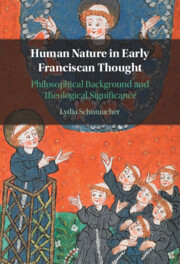Book contents
- Human Nature in Early Franciscan Thought
- Human Nature in Early Franciscan Thought
- Copyright page
- Dedication
- Contents
- Acknowledgements
- Key to Summa Halensis Citations
- List of Abbreviations
- Introduction
- 1 The Philosophy of the Soul c.1150–1215
- 2 Theological Background
- 3 The Soul and the Body
- 4 The Powers of the Soul
- 5 Cognitive Powers
- 6 Cognitive Powers in John of La Rochelle’s Summa de anima
- 7 The Reception of Averroes in Early Scholasticism
- 8 Cognitive Powers
- 9 The Affections
- 10 Free Choice
- 11 Angels
- 12 Conclusion
- Bibliography
- Index
10 - Free Choice
Published online by Cambridge University Press: 27 January 2023
- Human Nature in Early Franciscan Thought
- Human Nature in Early Franciscan Thought
- Copyright page
- Dedication
- Contents
- Acknowledgements
- Key to Summa Halensis Citations
- List of Abbreviations
- Introduction
- 1 The Philosophy of the Soul c.1150–1215
- 2 Theological Background
- 3 The Soul and the Body
- 4 The Powers of the Soul
- 5 Cognitive Powers
- 6 Cognitive Powers in John of La Rochelle’s Summa de anima
- 7 The Reception of Averroes in Early Scholasticism
- 8 Cognitive Powers
- 9 The Affections
- 10 Free Choice
- 11 Angels
- 12 Conclusion
- Bibliography
- Index
Summary
This chapter focuses on the doctrine of free will itself, which is one area in which the Summa Halensis draws more on Alexander of Hales than on John of La Rochelle. The two main areas in which it does so concern the questions of whether free will consists more in the will or in reason, and whether it can only will the good. On both these topics, the Summa Halensis departs from the past tradition represented most famously by Augustine in affirming that free will consists more in will than in reason and that it is capable of willing both good and evil.
- Type
- Chapter
- Information
- Human Nature in Early Franciscan ThoughtPhilosophical Background and Theological Significance, pp. 249 - 275Publisher: Cambridge University PressPrint publication year: 2023

